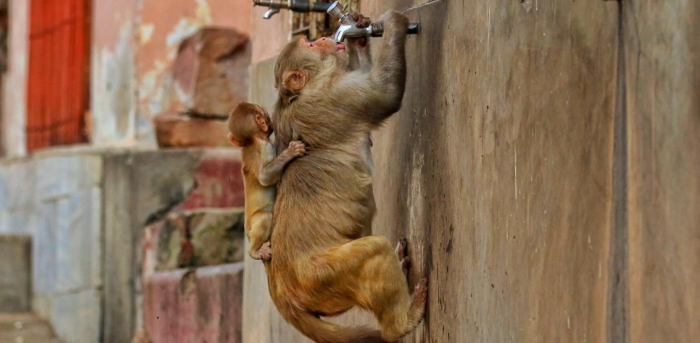Melvin Durai
Monkeys are a nuisance in many parts of India and the rest of the world, partly because they have a propensity to steal food and other objects. Monkeys are the gangsters of the animal world. Not all monkeys, of course, but the ones you come across in cities who haven’t yet found religion.
They travel around in gangs and get away with all kinds of crimes, largely because we don’t take their actions seriously enough. We think they’re just monkeying around, but if any humans choose to monkey around in similar fashion, we throw them in jail.
We imprison humans for burglary and theft, but the only monkeys we put behind bars are the ones who haven’t committed any crimes. Go to any zoo and you will find innocent monkeys being imprisoned. Meanwhile, their thieving kin are wandering free. They’re committing crimes without consequences, without even bribing the police.
Just drive around a big city like Delhi and you’ll probably spot a monkey stealing some food from someone, perhaps a vendor at a roadside stall. Tell a policeman about it and he’ll just shake his head and give you an expression that says, “That’s what monkeys do.”
Like other animals, many monkeys are just hungry and scavenging for food, but unlike dogs and cats, they’re very skilled at swiping. Some are just beginner thieves, still learning the tricks of the trade, while others are experts, possessing master’s degrees from MIT (Monkey Institute of Thievery).
Monkeys are a lot smarter than we think. They’ve been known to break into apartments, open refrigerators and help themselves to food. They’ve also been known to steal objects from people and hold them for ransom. Only when the people pay them in monkey currency (fruit, cracker, etc.) do they relinquish the objects.
A group of scientists studied these ransom-seeking monkeys and recently published a paper about them in a Royal Societyscience journal. The monkeys in the study — long-tailed macaques that roam freely around Uluwatu Temple in Bali, Indonesia — didn’t just seek food as payment for the objects they had stolen, they were able to figure out which items were more valuable and negotiate a higher reward for them.
If a monkey stole a tourist’s hat, the tourist could offer the monkey a cracker and get it back. But if the monkey stole a cellphone, a cracker wouldn’t suffice. The tourist would have to give the monkey a bag containing a few pieces of fruit, as well as tickets to watch the latest Shahrukh Khan movie.
You may believe that these monkeys are just “monkeying around,” but the sophistication of their scheme should scare you. What happens if these monkeys stop returning cellphones to tourists and others? What if they instead make phone calls to people, impersonating government officials, claiming that taxes are owed and demanding repayment in the form of bananas?
You may think this is farfetched, but there are many reports of monkeys behaving more and more like humans. Last May, for example, a group of monkeys attacked a laboratory technician at a state-run medical college in Meerut, Uttar Pradesh.
“Monkeys grabbed and fled with the blood samples of four COVID-19 patients who are undergoing treatment,” Dr SK Garg, a top official at the college, told Reuters. “We had to take their blood samples again.”
Garg and others were not sure what the monkeys did with the blood samples, but I have my own theory. The monkeys took the samples to their lab at MIT. They injected each other with human blood, part of a grand scheme to help them become smarter criminals. Before long, they’ll be stealing credit cards and ordering biryani for themselves through Zomato. The worst part is, I don’t think the monkeys will tip the driver.
